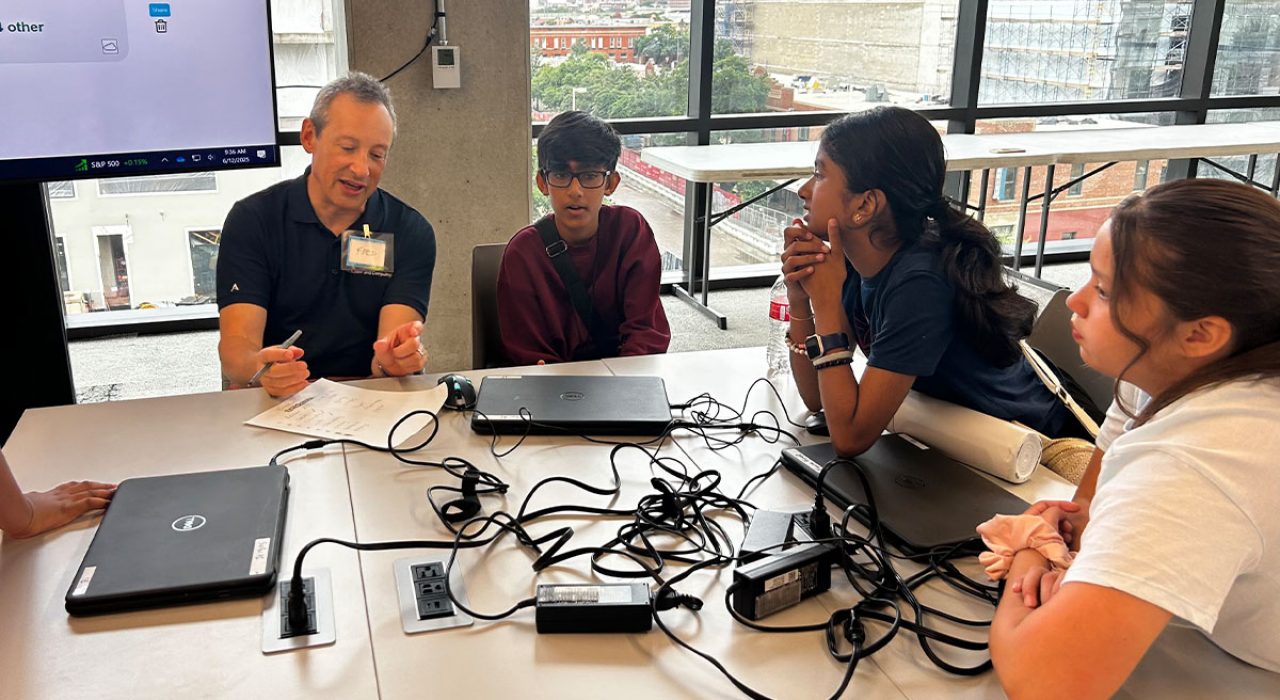Artificial intelligence (AI) has raised thorny issues across industries, from questions about copyrights to jobs of the future. At UTSA’s School of Data Science, a new challenge recently emerged: Could AI recommend the perfect snack?
The question came from a recent four-day summer camp called AI For Everyone! created and overseen by Fred Martin, the interim dean for the College of AI, Cyber and Computing and a professor in the Department of Computer Science.
The camp Martin leads introduces middle school students to foundational AI concepts through hands-on activities designed to spark curiosity and creativity.
“My whole career has been about creating innovative technologies that let kids be creators and authors in technology-rich environments,” Martin said.
The dean’s interest in the work traces back to his graduate student days at the Massachusetts Institute of Technology in Cambridge, Mass. That’s where he was part of a team that developed Lego Mindstorms, a series of programmable robotic construction kits.
He’s also no stranger to youth education. “I’ve been doing summer camps for kids since I was a doctoral student — I love it,” he said, “The middle school kids are the group that I enjoy working with the most. They’re super smart, creative, fun and have great ideas.”
Best and worst
AI For Everyone! campers interacted with AI in a variety of age-appropriate ways. The students learned how AI can edit or generate images, audio and videos — commonly known as deepfakes — and explored the ethical implications behind the technology.
In another activity, the students worked to discern whether they were chatting with a classmate or an AI bot, and learned how AI works to imitate natural language.
The campers also explored how AI learns from working on projects that “teach” the tech how to recognize physical gestures and another on how to build a snack recommender that identifies the best nutritional treat.
“Each table had a different snack food and they had to come up with words representing the food,” Martin said. “Then those words got entered and there was a training cycle and then you could ask it questions.”
While the algorithm quickly identified trail mix as the most nutritious option, it struggled with subjective evaluations like the “best” and “worst” snack. The AI eventually determined the answer to both was, in fact, trail mix.
“The kids loved this, and it became really competitive,” Martin said. “They were really engaged and were seeing AI in action and realizing that they could make things with AI, which was my goal.”
“Absolutely, my work is all about kids interacting with technology in creative and novel ways and, at the same time, reflecting on and paying attention to other people’s ideas, is a huge part of learning.”
Hands-on experience
While the camp focused on middle schoolers, Martin notes a significant portion of the work was performed by his own UTSA students who developed the technology and delivered the content.
Martin credited the camp’s success to the collaborative efforts of his team, including Computer Science staff member Debra Leal; postdoctoral fellow Ismaila Sanusi; and students Elif Ercek, Haven Kotara, Devin Marinelli, Durga Rajarajan, Dan Schumacher, Kayleigh Stallings and Nicole Tian.
“I involve my students in everything,” Martin said. “I have high expectations and give them a lot of responsibility. Each of them had a chance to lead something, and we were all supporting each other and the larger goals of the camp.”
Martin said the summer camp translates into invaluable hands-on experience for his students.
“Learning how to describe your work to other people is a huge professional development opportunity,” he said. “It helps you become a better scientist, and I think that is a benefit for my students participating in this camp.”
‘Huge part of learning’
The camp also included a research element. Martin and his team studied how the students interacted with the technology.
“Those were really precious moments where kids were being listened to, which I think doesn’t happen enough,” he said. “Absolutely, my work is all about kids interacting with technology in creative and novel ways and, at the same time, reflecting on and paying attention to other people’s ideas, is a huge part of learning. That’s as essential as anything.”
Based on the success of this year’s summer camp, Martin anticipates AI For Everyone! to become a mainstay at UT San Antonio. He also is considering a longer course, based on feedback.
“One of the middle school students said, ‘Why is it four days?’” he recalled. “I thought he was angling for a fifth day, but he wanted two weeks! We probably won’t do two weeks, but we might do five days.”



